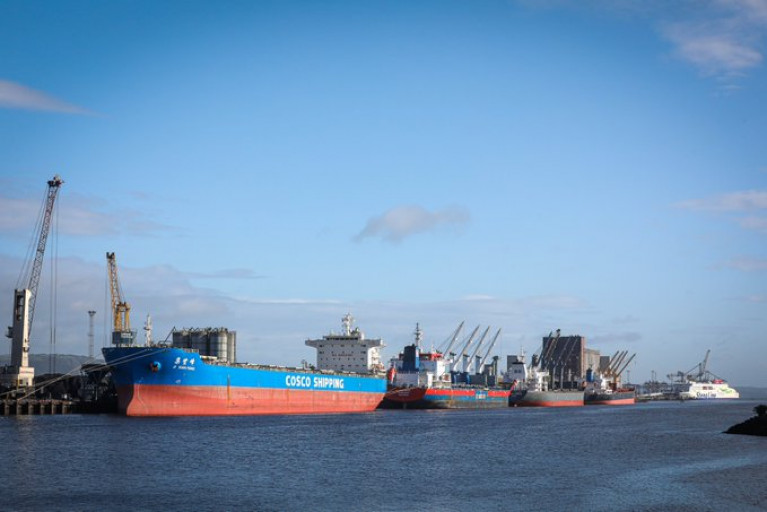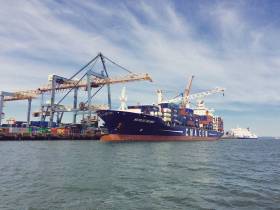Displaying items by tag: Record Trade
Bounce Back at Belfast Harbour With Record Trade as Brexit Pushes GB Traffic Away from Dublin
Belfast Harbour handled a record volume of trade last year, with Brexit checks cited as one factor.
The port said 25.6 million tonnes was handled in 2021, an increase of 9% on the previous year.
The trade volume was also up 5% on the pre-pandemic levels of 2019.
While a pandemic bounce back was one driver of the increase in trade in 2021, the harbour’s annual report also highlighted that Belfast had benefited from a diversion of traffic away from GB to Republic of Ireland routes.
While Brexit’s Northern Ireland Protocol requires checks on goods entering NI from GB, the processes are not as rigorous as those applied on GB shipments to Ireland.
Ongoing grace periods that have delayed the full implementation of the protocol are one of the main reasons for the differential in checks between NI and RoI ports.
Northern Ireland exporters can also sell unfettered in the rest of the UK market if they ship from NI ports.
More from ITV News including a comment from the CEO of Belfast Harbour on the trading results.
Record Trade through Belfast Harbour Hits 24.6m Tonnes
A record 24.6 million tonnes of trade was handled in Belfast Harbour for the first time in its 400-year history last year, latest financial accounts show.
Trade increased by 900,000 tonnes year on year, which The Irish Times reports has helped drive the harbour’s turnover up by 11 per cent to £68.8 million (€76.7 million) in 2018.
The harbour, which handles about 70 per cent of the North’s seaborne trade, also grew its operating profit by 6 per cent last year to £36 million, while capital expenditure increased by 24 per cent to £52 million.
The harbour’s strong financial performance last year was propelled by a significant increase in Stena Line’s freight vehicle traffic to and from Britain.
This jumped by 3 per cent year on year to a record 532,000 vehicles, and the harbour’s latest annual report shows that for the second year in a row more than 1.5 million passengers also passed through Belfast port – including about 200,000 cruise ship passengers.
Last year’s weather, which included a cold spring and hot summer, also helped boost the port’s bulk cargo sector, which grew to 9.9 million tonnes, primarily because of increased imports of grain and animal feeds, a sector which grew to a record 2.3 million tonnes.
For further reading including exports in aggregates to Britain click here.
Record for Belfast Harbour As 24.6m Tonnes of Cargo Handled in 2018
#belfastlough - A record 24.6 million tonnes of cargo was handled in Belfast Harbour last year thanks to a major increase in the number of freight vehicles passing through the port, which rose to a high of 532,000, latest figures show.
Trade at the port,reports The Irish Times, increased by more than 900,000 tonnes during 2018, as the total number of freight vehicles using Stena Line, which introduced a third larger ship on the Belfast to Liverpool route, grew 3 per cent.
The transport company has confirmed that two of its new E-Flexer RoPax vessels, which are currently under construction in China, will operate on the Belfast to Liverpool route from next year and in 2021.
The latest trading report from Belfast Harbour shows imports and exports of industrial coal by the Cookstown-based solid fuel importer and distributor LCC grew more than 37 per cent to more than one million tonnes during 2018.
LCC imports industrial coal into the North and then processes it at its Belfast plant before exporting it worldwide for use in the steel and alloy sectors.
For more on the figures including those for animal feeds, ferry and cruise sectors click here.
Recording Record Trade Levels in Belfast Harbour for 2017
#BelfastLough - Recording record trade levels, Belfast Harbour reached 23.7 million tonnes passing through the port in 2017.
The port writes The Irish News, handles more than 70 per cent of the north's seaborne trade, has seen a 3 per cent increase in its trade volume on 2016 in spite of the low level of growth in the local economy.
Significant and strategic investments by the port and its customers as well as the relative weakness in sterling on exports are described as key reasons behind the positive figures.
Freight traffic on StenaLine’s Ro-Ro (Roll-on / Roll-off) services continues to grow, reaching a record 514,000 vehicles, with external demand for Northern Ireland’s agri-food produce a key driver for the increase. Linked to this, demand for animal feeds and grains rose by 11 per cent to 2.2 million tonnes.
To read more on other sectors of the port click here.


























































